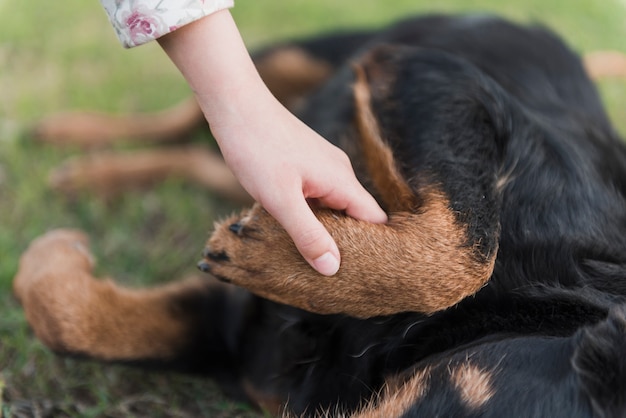Recognizing Gastrointestinal Issues in Pets: Signs and Next Steps


Recognizing Gastrointestinal Issues in Pets: Signs and Next Steps
As pet owners in Grand Prairie, you know how quickly your dog or cat can go from feeling great to suddenly acting “off.” Whether it’s a day of not eating, a few bouts of vomiting, or a change in bathroom habits, digestive problems are a common concern for many families. At Gully Animal Hospital of Grand Prairie, our veterinarians understand how distressing it can be to see your pet uncomfortable or unwell. That’s why we’re dedicated to providing comprehensive gastrointestinal care for pets in Grand Prairie and surrounding communities.
This blog will help you recognize the signs of pet illness related to gastrointestinal issues, understand what causes these problems, and know when it’s time to schedule an appointment with our veterinary team. If you’re searching for a “vet near me” for digestive problems or need guidance about pet gastrointestinal care in Grand Prairie, read on for expert advice and next steps. We’ll also explain how our diagnostic laboratory and surgical capabilities can support your pet’s health if more advanced care is needed.
Identifying Signs of Gastrointestinal Issues in Pets
Digestive troubles can show up in many different ways, and some are easier to spot than others. Key symptoms of gastrointestinal issues in pets include vomiting, diarrhea, loss of appetite, and noticeable changes in bathroom habits. You may notice your dog or cat straining to defecate, having accidents in the house, or producing stools that are loose, bloody, or unusually colored. Other signs of pet illness connected to the digestive tract are excessive drooling, abdominal pain or bloating, frequent licking of the lips, and lethargy. Sometimes, pets may hide, seem restless, or show a sudden reluctance to play or eat.
It’s important to remember that mild symptoms can escalate quickly, especially in young animals, seniors, or pets with chronic health conditions. For instance, a cat that skips a meal or a dog that has one bout of vomiting might recover with supportive care, but ongoing or severe symptoms suggest a deeper problem. If your pet is repeatedly vomiting, cannot keep water down, or shows signs of dehydration like dry gums or sunken eyes, these are causes for concern. Recognizing these early warning signs can help you seek timely veterinary care and avoid complications.
Causes of Digestive Problems in Dogs and Cats
Gastrointestinal issues in pets arise from a variety of sources. Common culprits include dietary indiscretion, where pets eat something they shouldn’t, such as table scraps, spoiled food, or non-food items like toys or plants. In Grand Prairie, seasonal changes sometimes bring about more opportunities for pets to ingest outdoor debris or encounter harmful substances. Sudden changes in diet can also upset your pet’s stomach, as can high-fat treats or unfamiliar foods.
Infectious causes like bacterial, viral, or parasitic infections are also frequent contributors. For example, roundworms, hookworms, and other intestinal parasites are prevalent in pets and can lead to ongoing digestive upset. For more information about parasites and prevention, the Companion Animal Parasite Council offers reliable resources. Food allergies, chronic illnesses such as pancreatitis or inflammatory bowel disease, and stress-related factors can also play a role.
Occasionally, more serious conditions like gastrointestinal obstructions occur when a foreign object lodges in the intestines or stomach, causing acute, severe symptoms. Tumors, ulcers, and metabolic diseases such as kidney or liver dysfunction may also manifest as digestive problems. Understanding the potential causes helps your veterinarian narrow down the diagnosis and tailor a treatment plan specifically for your pet.
Veterinary Treatment and Management of Gastrointestinal Issues
When you bring your pet to Gully Animal Hospital of Grand Prairie for gastrointestinal concerns, our veterinarians begin with a thorough examination and medical history. We may recommend diagnostic tests to identify the underlying cause of your pet’s symptoms. These may include bloodwork, fecal analysis, X-rays, or ultrasound, all available through our pet diagnostic laboratory services.
Treatment options vary depending on the diagnosis. Mild cases of gastrointestinal upset may be managed with supportive care such as fluids, prescription diets, and medications to control vomiting or diarrhea. Nutritional counseling is often helpful for pets with food allergies or chronic digestive issues, and our team can guide you through safe dietary changes.
For more severe cases, such as those involving blockages or foreign objects, surgical intervention may be necessary. Our hospital is equipped to provide advanced procedures, including gastrointestinal foreign body surgery and abdominal surgery, right here in Grand Prairie. In these situations, prompt diagnosis and treatment can be lifesaving. Rest assured, our veterinary professionals will explain every step of the process and tailor recommendations to your pet’s specific needs.
Home Care and Prevention for Pet Digestive Health
Caring for your pet’s digestive system starts with prevention. Feeding a balanced, high-quality diet appropriate for your pet’s age and health status is crucial. Gradually transition foods to avoid sudden dietary changes that can upset your pet’s stomach. Always provide fresh water, and avoid giving table scraps, fatty foods, or treats not designed for pets.
Monitor your pet closely for any signs of digestive discomfort, especially after dietary changes or exposure to new environments. Ensure toys and household items are kept out of reach from curious pets prone to chewing or swallowing foreign objects. Good hygiene, regular deworming, and staying up-to-date on wellness examinations help catch issues early and keep parasites at bay. If you suspect your pet may have ingested something toxic or harmful, the ASPCA Animal Poison Control Center is a valuable resource.
Remember that while some mild stomach upsets may resolve on their own, persistent symptoms or sudden changes warrant a call to your veterinarian. Our team is always available to discuss at-home care and prevention strategies tailored to your pet’s lifestyle.
When to Seek Veterinary Care for Digestive Problems
Knowing when to seek professional help can make all the difference for your pet’s recovery. Contact your veterinarian promptly if your pet experiences repeated vomiting or diarrhea, cannot keep food or water down, or shows signs of significant discomfort such as crying out, swelling of the abdomen, or sudden lethargy. Additional warning signs that require urgent attention include blood in stool or vomit, ongoing loss of appetite, or visible weight loss.
For pets with underlying health conditions, young puppies and kittens, or senior animals, do not delay in seeking help if you notice any digestive changes. Early intervention allows our veterinary team to diagnose and treat the issue before complications arise. If you’re unsure whether your pet’s symptoms are serious, our emergency veterinary care page provides guidance on what to do next and how to reach us outside of normal hours.
Scheduling a wellness examination is the best way to catch potential problems early and keep your pet’s digestive system healthy. Our veterinarians in Grand Prairie are committed to providing the highest standard of care for your pets, ensuring they receive the attention and treatment they deserve.
Your Trusted Local Resource for Pet Digestive Care
Caring for your pet’s digestive health is a partnership, and at Gully Animal Hospital of Grand Prairie, we’re here to support you every step of the way. By recognizing the early signs of gastrointestinal issues in pets and knowing when to seek help, you can make a meaningful difference in your pet’s comfort and recovery. Whether you need advice on prevention, diagnostics, or treatment options, our veterinary professionals are ready to assist.
If you are searching for a “vet near me” who provides compassionate, skilled care for digestive problems, or need the best gastrointestinal veterinary services in Grand Prairie, we invite you to schedule an appointment with our team. You can call us at (214) 412-2462 or visit our Grand Prairie location for comprehensive support. Don’t hesitate to reach out if your pet is showing signs of illness—our team is always here to help with all your pet care needs, from diagnostic laboratory services near me to ongoing wellness and prevention.
For further information about our approach to pet digestive health or to schedule your next visit, explore our diagnostic laboratory services or reach out to our team of veterinarians today. Your pet’s health and happiness are our highest priorities.



















